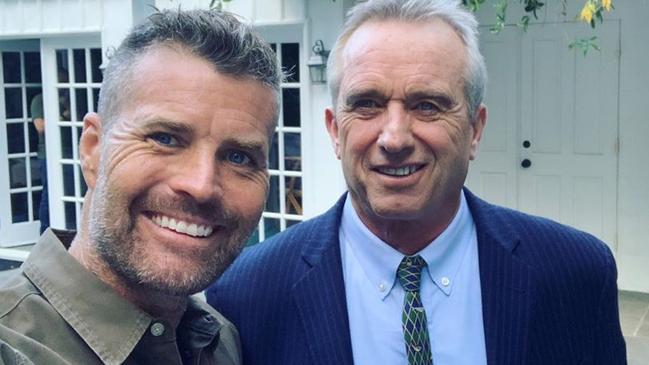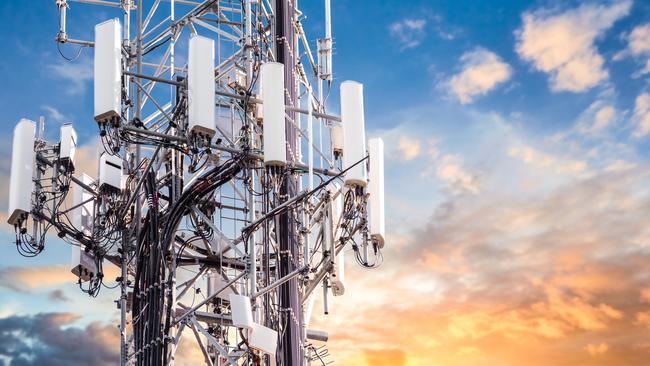David Penberthy: Pete Evans’ COVID-19 ‘science’ is the symptom to a greater information problem
While it’s tempting to simply hate chef Pete Evans and call it a day, the real issue should be asking how his kind of actual fake news has been allowed to thrive online for so long, writes David Penberthy.
Of the many unusual phobias, lyssophobia is the most confounding.
It is a mental disorder framed around a fear of developing a mental disorder, whereby the lyssophobic person is so worried that they’re going to lose their mind that they actually lose their mind.
I have generally travelled alright in the melon department, but I started to reflect on the nature of lyssophobia this week while reading Pete Evans’s Instagram account.
If you have seen it – and don’t waste any time hunting it down, it’s now been deleted -
it included what may well be the craziest graphic in human history, which bears the words “Great Solar Flash” and “Great Awakening”, and purports to arrange all of the links between every conspiracy the world has ever seen.
It covers everything from Mayan space travel to the apparent existence of a slave colony on Mars, NASA cover-ups, Tibetan Buddhism, psychotropic mushrooms, something called multidimensional travel.
It’s designed as a flow chart and it looks like something your HR manager would have drawn up if your HR manager was Syd Barrett and had dropped LSD half an hour before facilitating a management retreat, which come to think of it would have been more entertaining than any management retreat I’ve attended.

I was looking at this graph for a few minutes and it occurred to me that this is what actual madness looks like. It is so unnervingly deranged that, at the risk of sounding lyssophobic, it feels that if you stared at it long enough you could do irreversible damage to your brain.
The nature of this flow chart tells a greater truth about the world we inhabit in 2020 and the manner in which our new digital lives have been altered by the most influential invention of the past few decades, the internet.
The internet is in equal parts the best and worst invention in history. It’s managed to make the world smarter and dumber, more civil and more abusive, less mysterious and more confusing than ever before.
It has kept us socially connected at a time of pandemic-inspired social distancing, which is a break from its usual role of keeping us socially apart, with families of four sitting on the couch of an evening with their device of choice, one watching TikToks on his phone, the other a Netflix film on the iPad, Mum checking Facebook and Dad absent-mindedly scrolling through last year’s matches on the Footy Live app, remembering a happier time when football provided our lives with structure and meaning.

It’s made it easier for kids to access information in an instant, and harder for them to absorb that information, more tempting for them to plagiarise it, killing off time-honoured skills such as accessing primary texts or mastering the Dewey decimal system in the space of a generation.
It enables noble online campaigns around domestic violence and the treatment of women while being jam-packed with the most putrid and demeaning sexual content amassed in history.
It’s made it easier to communicate civilly with workmates, and easier to get yourself sacked for sending an email in haste or anger.
The thing that most worries me about the internet is its undiscerning capacity to present the most fatuous and fanciful bits of garbage – as per Chef Pete’s zany space graph – alongside all the important facts and figures and historical accounts that make up the sum total of human knowledge. It’s like a lavish and delectable smorgasbord with the finest food in the world, peppered with bird droppings, and too many people have trouble sorting the good stuff from the crap.

Be it dangerous anti-vaccination nonsense, demented theories about the American flag not flying during the moon landing or the supposed controlled detonation of the Twin Towers, the presentation of any number of mad theories alongside actual facts means an increasing number of people are now wandering helplessly down the path towards full-blown stupidity.
I know the media doesn’t have a spotless reputation but, in all honesty, the mainstream press is generally motivated by a desire to make sure the information it publishes is correct.
This is a point worth remembering as the Googles and Facebooks of the world demand to be treated like publishers. With all their aggregating/thieving of mainstream news, Google and Facebook have audaciously devised a way to mounts the journalistic efforts of others, simply because they’re good at organising things.
The two sites are the ultimate digital equivalent of the East End thief who’s got his neighbours’ Wedgwood china laid out nicely in the boot of his car at a black market on Tower Bridge Rd.
Theft aside, their lack of discernment should really strike out any claim these organisations have to being publishers. In the past two months we have seen extraordinarily creative efforts from traditional media, even simple little things like the Hibernation section in the daily newspapers, aimed at giving readers helpful information to negotiate a crisis unseen in our lifetimes.

Newspapers and news sites have taken great steps to provide accurate and up-to-the-minute daily hard news around infection rates, displayed with meaningful and intelligible graphs, discussion by genuine experts about the quest for a vaccine, reliable medical advice about symptoms to watch for, where and how to get tested.
This is what traditional publishing looks like, whereas the unofficial mission statement of the digital publishers might as well be: All the news that’s unfit to print.
If as a publisher you can’t tell the difference between a Pete Evans graph and the periodic table, publishing isn’t really the game for them, at least not in any responsible, illuminating or useful fashion.
It would be less concerning if a lot of this stuff was simply stupid, as opposed to dangerously stupid, and you wound up buying a COVID-curing lamp because a reputable-looking website urged you to do so.

